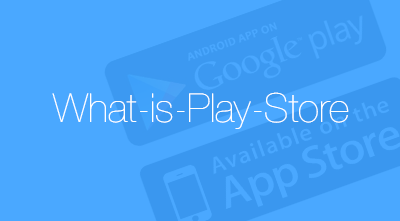What is Play Store?
Google Play Store is the digital distribution service developed by the Google, and it is the official App Store for the Android phones and tablets.

For anyone who owns an Android smartphone, Google Play Store is by far the most popular one-stop destination for a variety of new apps and other digital media. As of February 2017, the online repository features over 2.7 million Android apps and over 40 million songs. Whether it’s movies, music, magazines or digital books, Android users are likely to find it first on Google Play.
Of course, Android users need an app that lets them access this available content. The Google Play Store, introduced in March 2012 after Google combined its Android Market and Google Music services into a unified digital distribution platform, gives Android users direct access to Google Play. Non-Android users can still access their content directly through the Google Play website.
What It Offers Consumers
Pre-installed on every Android device, the Play Store offers a convenient way for Android users to purchase, download and install applications created by Google as well as those from third-party developers. The app also features security measures to protect its users against malware, spyware and other threats. One such measure, known as Play Protect, exists within the Play Store app as an automated virus and malware scanner.
But Google Play offers more than just Android apps. The Play Store also encompasses other media that were once offered as standalone products. For instance, e-books that were once offered through the Google eBook Store are now offered as a part of Google Play. Music, movies, television shows and other media that were offered through separate channels are now available through Google Play using the Play Store app or the website.
What It Offers Developers
Android app developers can also take advantage of a variety of monetization features within the Play Store app. For instance, developers can sell their apps a one-off payment prior to installation, sell durable or consumable in-app digital products and give users subscription-based access to content. Developers can also offer low-cost or free ad-supported content through AdMob.
The Android app development process for Google Play features a number of stringent guidelines to ensure that only quality apps are submitted. Before developers can submit their apps to the Play Store, they must first register for a developer account. Certain types of content, including sexually explicit content and content that promotes violence, bullying & harassment, are prohibited from being published to the Play Store.
Play Store Optimization
Optimization is crucial for ranking well within the Google Play ecosystem. One unique challenge facing android app developers in this regard is the character limit imposed for keywords. Google Play Store only offers 30 characters, requiring creative keyword usage in order to maintain both the app title and include critical keywords for ranking purposes.
The Play Store also lacks a dedicated keyword field, requiring developers to instead optimize their keyword usage within the 4,000-character description field without resorting to repetition, junk tags or gratuitous length that could clutter some Android devices. It’s worth noting that the first 167 characters of the description are utilized as a meta description for the main app page.